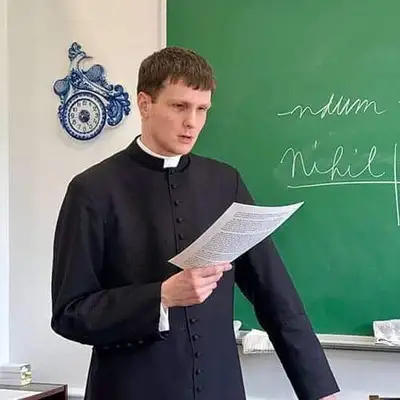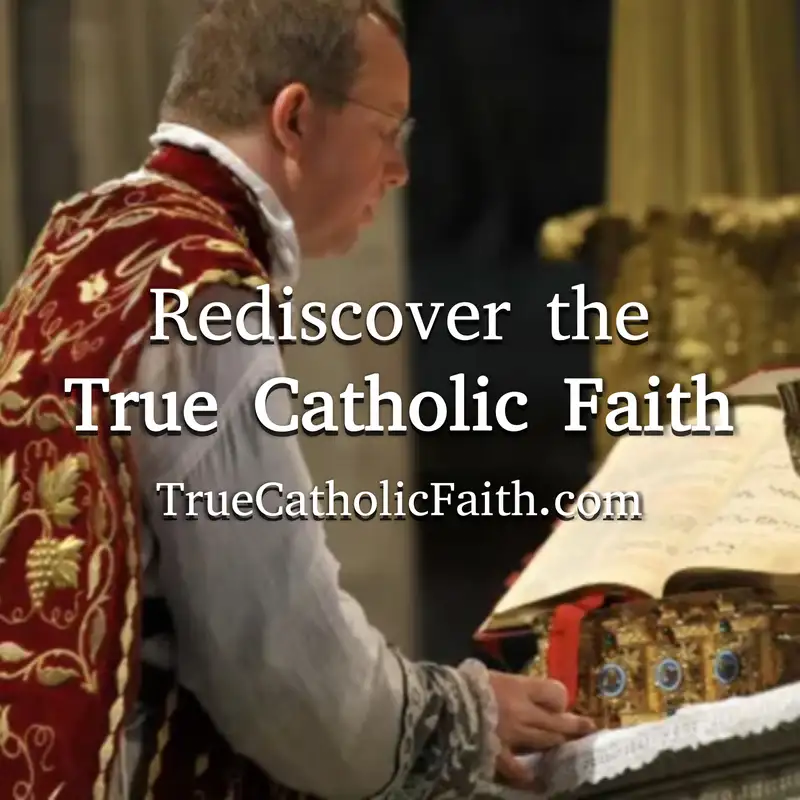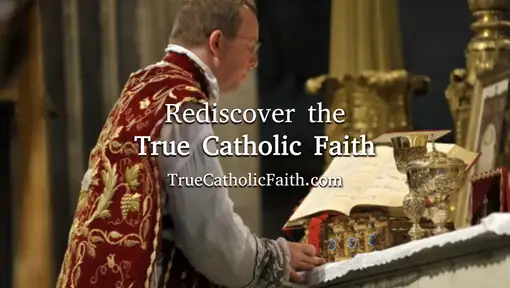The Mass vs. The Novus Ordo Service - Fr. Luke Petrizzi 08-01-25
Download MP3I have compassion on the multitude, for behold, they have now been with me three days and have nothing to eat. In the name of the Father, and of the Son, and of the Holy Ghost. Amen.
Fr. Luke Petrizzi:Today we see a manifestation of our Lord's divine power in multiplying seven loaves and a few little fishes for the purpose of feeding a crowd of 4,000. This miracle was, of course, worked effortlessly by our Lord through his divine power.
Fr. Luke Petrizzi:He is, after all, the second person of the blessed Trinity to whom all things are possible. It took him no more efforts to do this than it did for him to change water into wine at the wedding feast of Cana in his very famous first public miracle. If we might add to all of this, that neither does it require of him any effort to change bread and wine, ordinary elements of human nourishment, into his own body and blood. And he did, in fact, change bread and wine into his own body and blood. In fact, he does this every single day in which valid masses are offered because it is indeed Christ himself who works transubstantiation at every mass that is ever offered.
Fr. Luke Petrizzi:This is something that is obviously within the power of God to do. In addition to the examples that we have already mentioned illustrating the power of God, We have also these words of Saint John the Baptist in the third chapter of Saint Matthew's gospel. Words that he spoke as he addressed the Pharisees and Sadducees. He said to them, you brood of vipers, who hath showed you to flee from the wrath to come? Bring forth, therefore, fruit worthy of penance.
Fr. Luke Petrizzi:Penance. Think not to say within yourselves, we have Abraham for our father. For I tell you that God is able of these stones to raise up children to Abraham. This statement of Saint John the Baptist is quite literally true. Let us not imagine for a moment, not for a split second, that is somehow outside the power of God to change a literal stone into a human being who is a true son of Abraham.
Fr. Luke Petrizzi:Such a consideration, while it indeed ought to cause us to have ever greater admiration for the power of God, ought not to surprise us inasmuch as we ought already to acknowledge and profess the truth at hand, at least in the sense that we do indeed believe what we say when we say that God is omnipotent, that he is almighty, that he is all powerful, that there is absolutely nothing beyond his power. And so when our Lord says, this is my body, this is the chalice of my blood, In such a way and under such circumstances that his apostles took it quite literally, this is my body, this is my blood. And when the Church of which Our Lord is the immediate founder, the divine founder, has always taught us exactly the same, when we have this crystal clear understanding and explanation of divine revelation unmistakably presented to us, we can very easily avoid the trap into which many poor heretics have fallen of imagining that these words were not intended in the literal sense in which Our Lord indeed intended them. And when the priest who offers the Mass, the true Mass validly, pronounces those exact words, intending them in the exact same literal sense in which Our Lord himself pronounced them at the Last Supper, the exact same effect is produced as when Our Lord pronounced those words at the Last Supper.
Fr. Luke Petrizzi:And he, the priest at the altar, pronounces them as though forgetting who he himself is. The priest pronounces these words as though the only thing that he knew of himself is that he is a representative of God, that he is another Christ. And lest we be stanalized at the use of that term, another Christ, let us keep in mind that it is applied by the church herself to priests, since priests do indeed wield the very power that Christ himself wields. In fact, he exercises this power through his priests. And even with all of the truly awe inspiring aspects of the power granted by Christ to his priests, for example, the ability to forgive sins, the power of absolution, even considering all of those awe inspiring effects, still the greatest of all of them is the offering of the mass.
Fr. Luke Petrizzi:A greater act than which our Lord himself did not perform while on earth. We said a bit earlier that the priest, the secondary offer of the sacrifice of the mass, intends the words that he pronounces into the exact same sense in which Christ himself intended them, and indeed still intends them to be pronounced. And this is most certainly true whenever the priest truly has the intention to offer Mass. And for clarity's sake we will point out that every validly ordained and properly trained traditional Catholic priest always has this intention, the correct intention in offering the mass. All things considered, the bar for this correct intention is very low and every such priest knows exactly what it is.
Fr. Luke Petrizzi:On the other hand, the ministers of the Novosoda religion cannot be so dependent upon. Their masses are invalid, and this is even abstracting from the fact that their ordinations are almost every single one of them at this point also invalid. This is abstracting from all questions concerning the translation of the words of consecration used in the Novusardo, translations past or present. The very rites of the Novus Ordo Missae would have him who carries out the ceremony pronounce the words that Our Lord pronounced at the Last Supper, if indeed that offerer does pronounce them correctly, in simply the manner of historical narration. The institution narrative they call it in the general instruction of the Novus Ordo Missile.
Fr. Luke Petrizzi:And when we hear the term institution narrative, we might at first be inclined to dismiss it as nothing more than an example of the typical practice of the Novus Ordo to substitute for very simple terms such as the words of consecration, other terms that are, will come across as far more pretentious. But on closer examination, it becomes clear that the Novosorto priest offering the Novosorto Mass actually does not intend if he has the intention indicated by the very rite that he is using, he does not actually intend to speak these words in the person of Christ as one offering the holy sacrifice of the mass here and now. This is clear from a study of the Novosorta Missile itself and it is also clear from the testimony of Novosorta priests, among them former Novosado priests who have come to us and told us that it came as a revelation to them at a certain point that the Mass is a sacrifice. This was a realization that came after some time along with the realization that in order to have the intention to offer the sacrifice of Calvary again in an unbloody manner, which is the very nature of the Mass, that they had to have the intention to do something contrary to the right that they were using.
Fr. Luke Petrizzi:To put this into perspective, a traditional Catholic priest offering the traditional mass is presumed to have the intention of actually offering the mass because that is clearly what is indicated by the rite that he is using. The Novosoda priests, on the other hand, is presumed not to have the intention of offering the mass because that is what is indicated by the rite that he is using. If he intends to offer the sacrifice of the mass, then he has an intention contrary to what is indicated to him to do by the very right that he is using. And perhaps all of this talk of intention might come across as confusing or perhaps not, but let us still make ourselves abundantly clear, human intention does in fact play a very important role in various aspects of sacred theology. For example, with regard to the sacraments, in the case of a priest who is validly offering the mass, it is he who determines of the valid matter for the holy Eucharist placed before him what is actually consecrated.
Fr. Luke Petrizzi:If he intends, for example, to consecrate that which and only that which is placed on the corporal in front of him, and at the consecration of the Mass there is one stray host perhaps that is an inch outside of the corporal, then that host, the one outside of the corporal, is not consecrated. This does not ordinarily happen but it could. This is theoretically possible. And this can happen even if there are hundreds of hosts placed in a very large suborium actually on the corporal in front of him. But if he intends not to consecrate anything outside of the borders of that corporal, then that one stray host remains ordinary bread.
Fr. Luke Petrizzi:Even if it is placed in very close proximity to many hundreds of hosts under whose accidents of bread, the body and blood of Christ are now in fact present. The almighty power of God, which actually effects transubstantiation, only effects it under the matter that the secondary offerer of the mass, the human being, the priest, intends. And if he does not intend it at all, then almighty God effects no transubstantiation. And once again, the offer of the novusardo, if he actually intends that which the rite that he is using indicates to him, then he does not intend to effect transubstantiation. Such is the situation with which we are faced today.
Fr. Luke Petrizzi:The supposed hierarchy of the Catholic church, as they claim to be, is foisting upon us an invalid rite of mass. This is just one of the many nails in the coffin of the novus order, Just one of the things that proves beyond any possible doubt that they are definitely impostors. The indefectibility of the church prevents the promulgation of any such evil right to the church. Now they are also clearly impostors because they do not intend, and again we see the importance of intention, They do not intend to carry out the function of the hierarchy of the Catholic church, which was of course founded by God himself and who also determines its nature and purpose. The perpetrators of the novassorta religion intend something else entirely, which is contrary to and necessarily exclusive of that which was ordained by Christ himself.
Fr. Luke Petrizzi:And since that is the situation that faces us today, we who have received the grace to remain or perhaps to become faithful to the actual sacrifice of the mass, may paraphrase the words of our Lord from today's gospel in which he says, I have compassion on the multitude. And we may paraphrase these words in the manner in which a traditional Catholic bishop once paraphrased them in this manner, I have compassion upon the sacrifice. And we mean this in the sense that we deplore the fact that the Novosarna has produced essentially a Protestant supper service that is nothing more than a mockery of the mass. We deplore that state of affairs and are entirely committed to performing the part assigned to us by divine providence in the work of preserving the holy sacrifice of the mass upon the earth and making it available for all those who have remained faithful to it to assist at it. Our Lord Jesus Christ, in becoming man for the purpose of dying on the cross for the sins of man, was made indeed obedient unto death.
Fr. Luke Petrizzi:Our Lady remained at the foot of the cross all the way to the same very bitter end, all the way to the death of her divine son upon the altar of Calvary. And in seeking a model for what kind of compassion we ought to have upon the holy sacrifice of the mass and for devotion to it, we may look to the mother of God who suffered so much in beholding the sufferings of her divine son that she would have died of grief had it not been for the miraculous intervention of God preserving the union of her body and soul throughout the painful events of the passion and the death of our Lord. If we have a devotion to the mass that is servant to even a fraction of that degree, and if all things are ordered about our assistance at the Mass, we may indeed count upon receiving, as a result of our devout assistance at the Mass, graces which are necessary for our eternal salvation. And let us make no mistake, even with the state of affairs being what it is, we most definitely still stand in need of these graces and of the graces which are of course afforded to us by receiving sacraments, most of all the Holy Eucharist which we can and indeed must still receive even under our current circumstances.
Fr. Luke Petrizzi:To say otherwise would be as irrational as to say that we must starve to death because our enemies will that we should. It would be far worse in fact than that. So acquire the devotion that we have described, remain faithful to it, ever seek to increase in it and all will be well for you in eternity.
Fr. Luke Petrizzi:In the name of the Father and of the Son and of the Holy Ghost. Amen.
Creators and Guests


